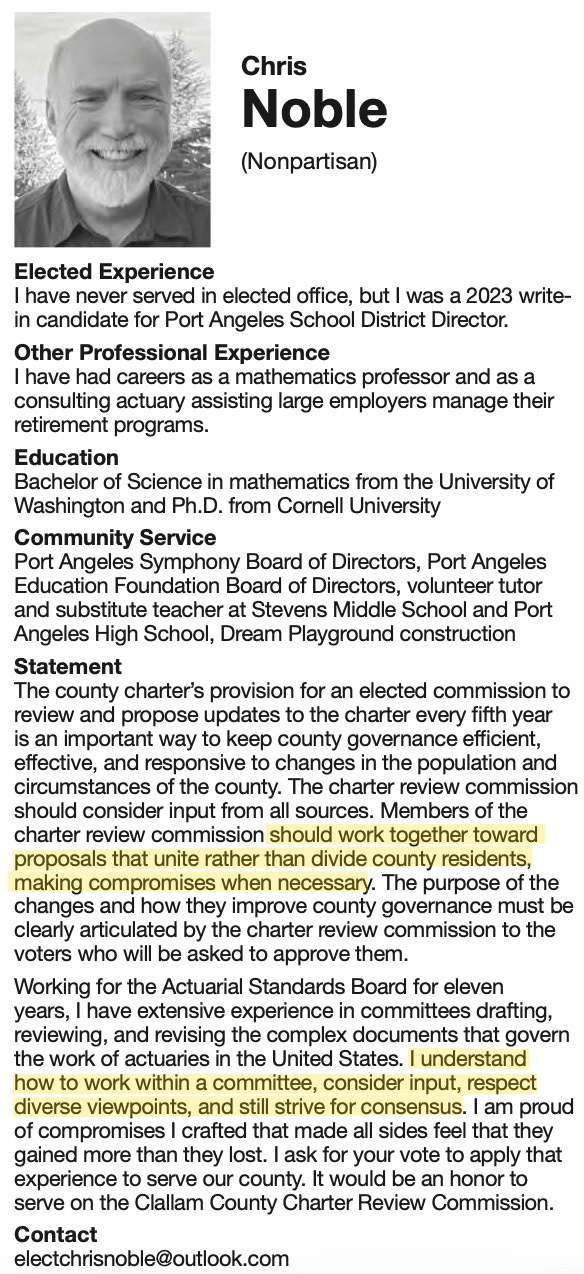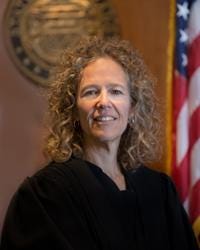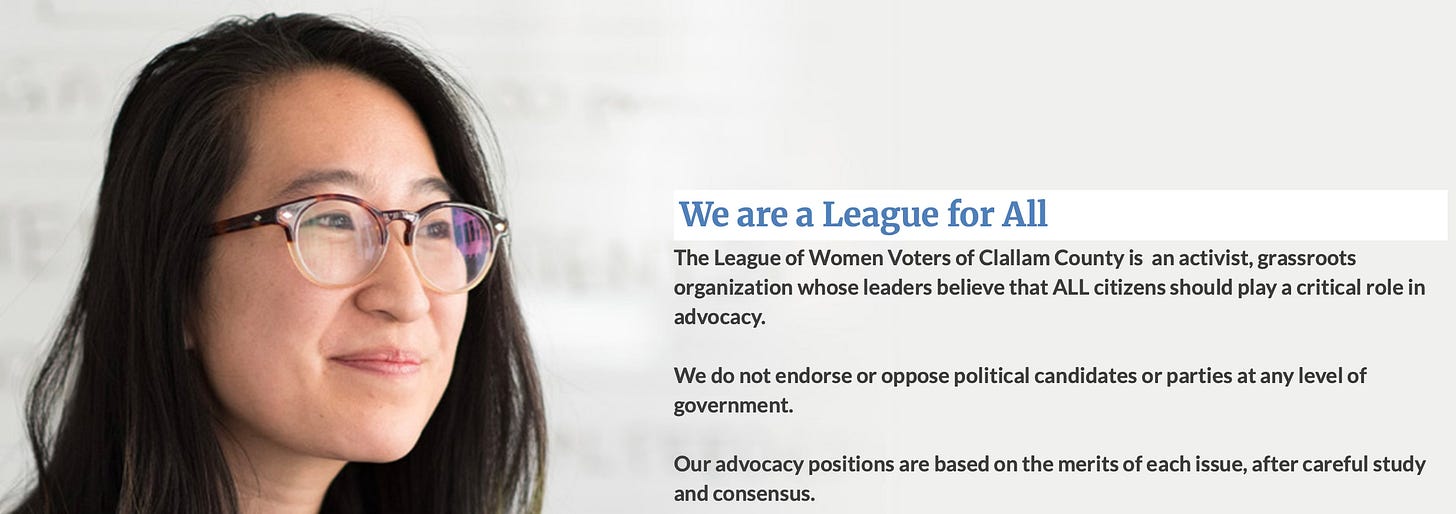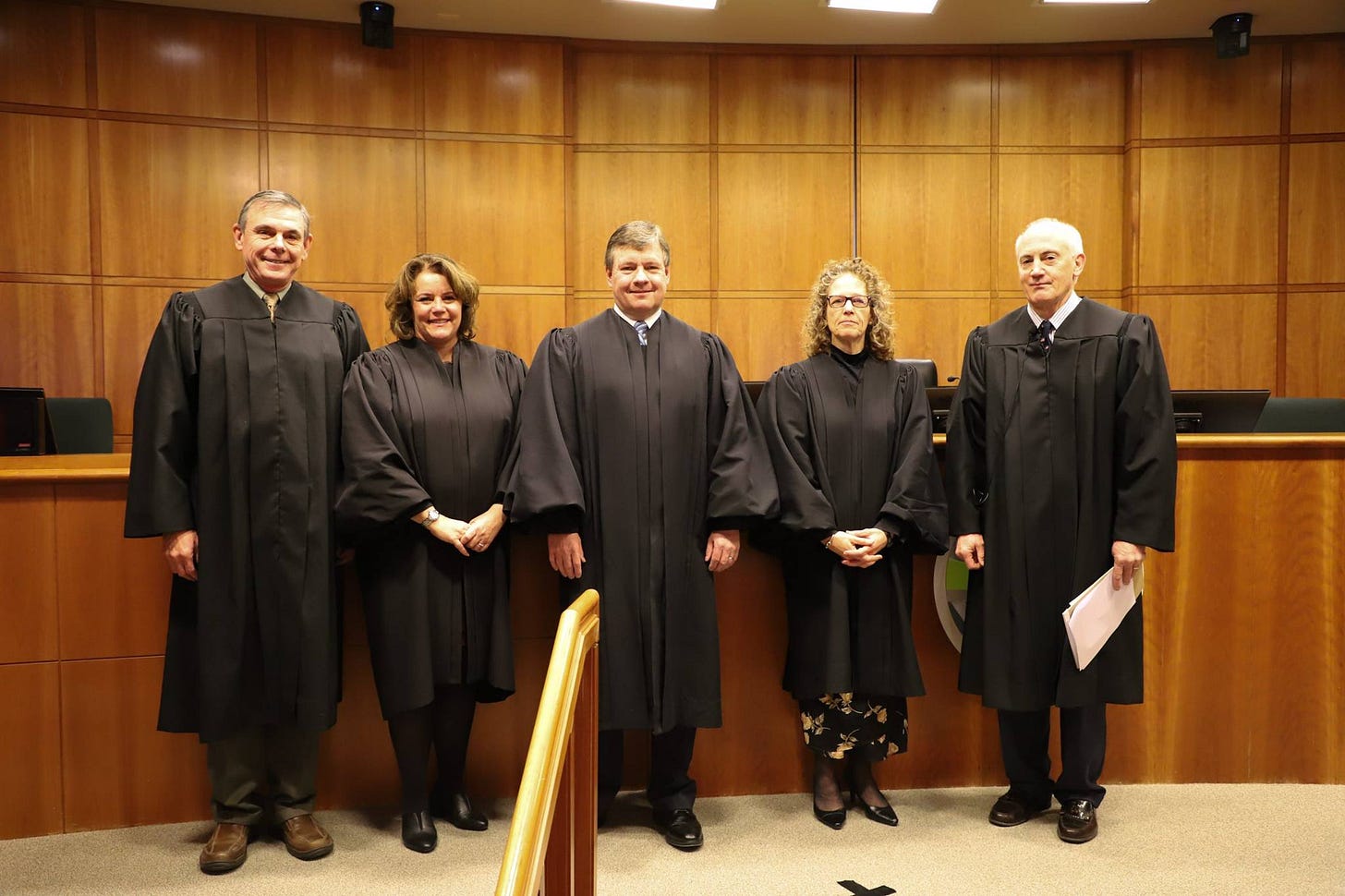At recent meetings of the Clallam County Charter Review Commission, one pattern has become impossible to ignore: certain agenda items keep getting blocked—not by policy, but by personalities. Attempts to seek clarity on public spending, governance processes, and potential legal violations have repeatedly been shut down by the Commission’s Executive Committee. Meanwhile, the same leaders who campaign on transparency and civic participation appear to be enforcing a different standard behind closed doors. This is a firsthand account of how internal politics—not public interest—shaped the Commission’s work in 2025.
An unmistakable pattern has emerged throughout the 2025 Charter Review Commission meetings: certain agenda items—specifically, those concerning taxpayer-funded security provided to Commissioner Jim Stoffer—keep disappearing. Either they are removed, excluded, or declared “ineligible” for the agenda. And every one of these blocked items originated from the same commissioner:
Me.
The issue is not whether Commissioner Stoffer received security. It’s that this security was funded by taxpayers, arranged through a private company, and coordinated by Charter Review Chair Susan Fisch, County Commissioner Mark Ozias, County Administrator Todd Mielke, and Sheriff Brian King—all without a properly noticed public discussion. If this occurred outside open session, it may have violated Washington’s Open Public Meetings Act (OPMA). At a minimum, it deserved scrutiny. But the Charter Review’s Executive Committee refuses to even allow a discussion about the costly arrangement.
Three Attempts, Three Roadblocks
Attempt #1: The discussion was placed on the agenda—until Commissioner Paul Pickett made a motion to remove it. A majority agreed.
Attempt #2: Two weeks later, I requested the item again. The Executive Committee— Susan Fisch, Chris Noble, and Mark Hodgson—simply refused to include it. When I asked why my items were rejected while Commissioner Stoffer’s were accepted, Chair Fisch responded: “Well, that was a while ago,” and she closed discussion.
Attempt #3: I proposed an agenda item titled “The Chilling Effect.” Noble rejected it, claiming it didn’t relate to a charter amendment or recommendation.
No such rule exists. However, I followed his advice and moved to add the item at the start of the meeting. The majority again refused.
When I asked why I was the only commissioner who had to fight to get items on the agenda and have the entire commission vote—while others could add them freely— Chair Fisch recessed the meeting rather than answer.
During that recess, I asked whether this unwritten rule about pre-approval applied only to me. Fisch replied that she was not speaking to me and said I could “review the record” myself—meaning hours of video—rather than simply answer the question.
I don’t need to watch the tapes. I’ve been there—in person—every meeting, every town hall, and every subcommittee I belong to. I am the only commissioner with perfect attendance.
“Why would any commissioner want to talk to you?”
When I asked Commissioner Noble why I was the only one treated differently, he replied: “Why would any commissioner want to talk to you after what you did in March?”
What “I did” in March was write an article—on my own time—about whether county government should conduct business on sovereign land. A public commenter asked me to provide proof that sovereign land has different requirements. She identified herself as an elected official in her comment. I responded with facts, published our email exchange, and identified her by name—Patrice Johnston, Sequim School Board member—using only public documents.
Everything I published was already in the public record.
Yet the Commission then spent nearly 7 hours of meeting time attempting to determine whether I had somehow violated law or policy by publishing publicly available information. No citizen initiative received as much attention. No governance reform received as much analysis. Instead, the greatest expenditure of time in the entire 2025 Charter Review process was spent debating whether CC Watchdog should be allowed to publish public documents.
This effort was led by Chair Fisch and Commissioner Stoffer, with Commissioners Noble and Christy Holy attempting to impose a new bylaws rule restricting what commissioners could do with public information on their own time. It would have been a blatant violation of commissioners’ First Amendment rights.
Throughout the discussion, the allegation was that I had “harassed, bullied, attacked, and intimidated” Ms. Johnston. I repeatedly asked for proof. None was ever produced except for an anonymous email that Susan Fisch, a retired judge, produced hours before the Bylaws Committee convened.
The proposed rule—to forbid commissioners from identifying public commenters—failed. But the damage had already been done, I just didn’t know it yet.
The Real Chilling Effect
Ironically, the term “chilling effect”—which Fisch applied to my conduct—accurately describes the actions of the Executive Committee itself.
A chilling effect occurs when an official’s actions discourage people from speaking or participating. When Noble told me that Fisch refused to speak to me, and that the Executive Committee had quietly agreed to suppress my agenda items because of an incident that occured seven months prior, that was a chilling effect. It silenced not just me—but the district and county I represent.
My constituents deserve equal representation, but personal grievances were used to restrict their voice. No law or rule justified this. The only explanation offered was a months-old disagreement that I had with Fisch’s friend—Patrice Johnston, a fellow League of Women Voters member.
This is not governance. It’s retribution.
The League’s Values—And the Disconnect
Chair Fisch ran as the Secretary of the League of Women Voters of Clallam County, an organization known for nonpartisanship and advocacy for open government. The League’s leadership frequently sits in the gallery and observes Fisch overseeing Charter Review Commission meetings.
The League’s own mission statements include:
“We are a League for all.”
“We encourage informed and active participation in government.”
“We work to increase understanding of public policy issues.”
“We are a nonpartisan political organization.”
“Our issues are grounded in our history of making democracy work for all Americans.”
Yet under Fisch’s leadership, the Charter Review Commission repeatedly suppressed dissent, blocked agenda items related to transparency, and sidelined a duly elected commissioner representing an entire district, and the Executive Board didn’t reveal for months what Fisch was doing or why she was doing it. That is the opposite of encouraging participation. It is the opposite of nonpartisanship. And it is the definition of a chilling effect.
Why an OPMA Discussion Still Matters
If elements of the Stoffer security arrangement occurred outside properly noticed meetings—as evidence suggests—they may have violated the Open Public Meetings Act. OPMA violations can:
invalidate government actions
result in civil penalties
expose the county to legal challenges
erode public trust in governance
If the Commission’s work is invalidated because Susan Fisch, Chris Noble, and Mark Hodgson made critical decisions behind closed doors, then every commissioner’s time—and every taxpayer dollar spent supporting the process—was placed at risk by the very people enforcing silence.
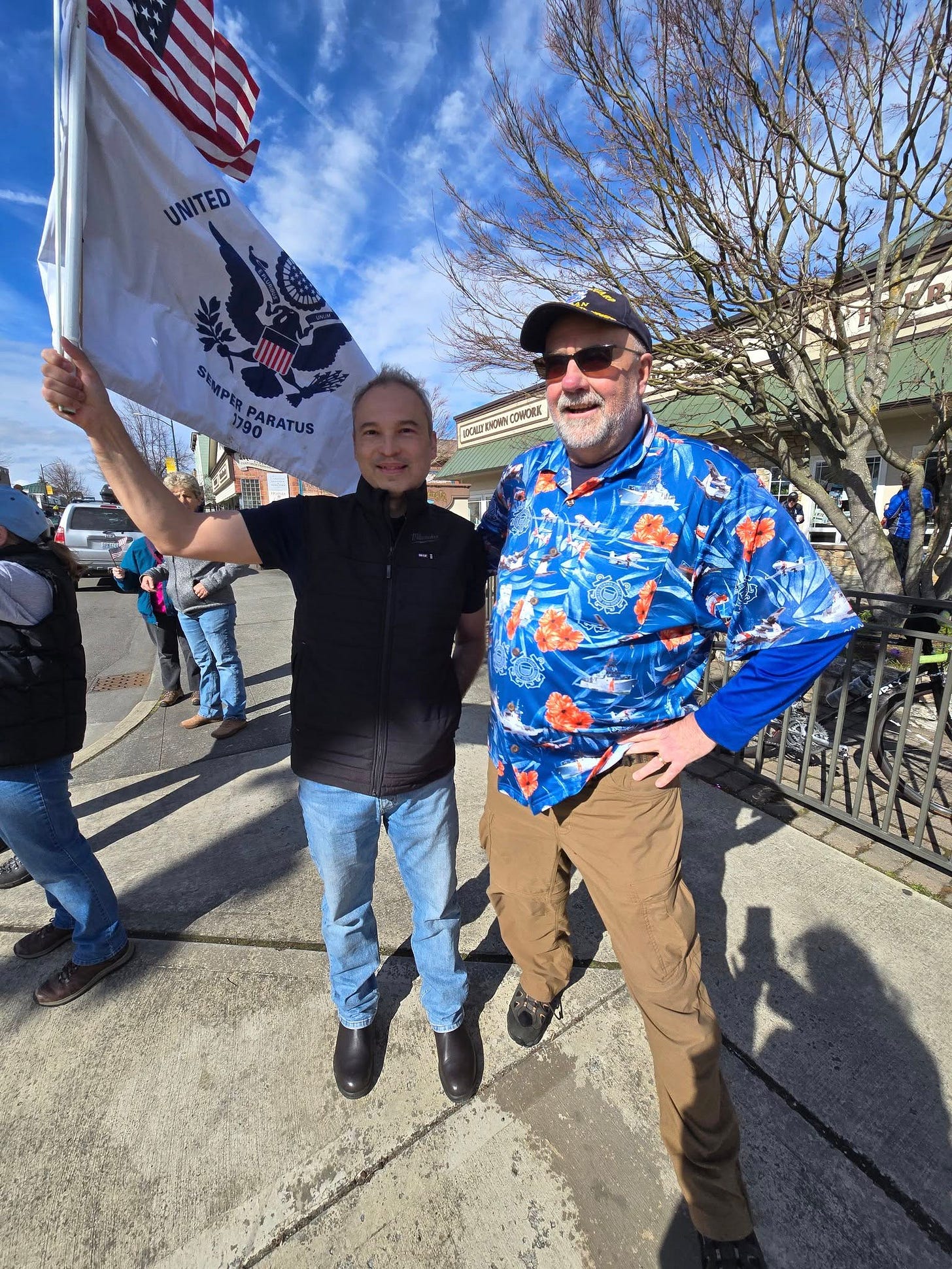
A League of Their Own
The Secretary of the Clallam County League of Women Voters—a group founded on expanding public participation—has overseen a Charter Review process in which dissenting voices are chilled, participation is restricted, agenda items are suppressed, and personal grievances override public interest.
A body meant to improve governance became, at times, an echo chamber driven by personalities, not principles. Clallam County’s five-decade-old Charter deserves better than to be treated like a private club.
The Charter Review Commission meets tonight at 5:30 p.m. at the Clallam County Courthouse. The agenda and instructions for attending in person or remotely are available through the county’s website.
Democracy requires participation and constant vigilance—even when trusted institutions position themselves as the gatekeepers.
Bonus Content for the Dedicated Reader
Dear Executive Board,
I am again formally requesting that the following agenda item be added to the upcoming Charter Review Commission meeting:
Agenda Item: CRC Security and Possible OPMA Violations
This discussion is necessary due to events stemming from the July 14th public comment by Eric Fehrmann, subsequent email exchanges, and testimony given by County Administrator Todd Mielke on September 22, 2025.
Questions That Require Commission Discussion
What specific threat did Commissioner Stoffer perceive on July 14?
When Stoffer said he would “take steps to protect myself,” does that include carrying a weapon in a weapon-free zone?
Why was security not present at CRC meetings before July 14 if risk was known?
Why is security not present at all public meetings on county property if it is now deemed necessary?
Was OPMA violated by arranging security without deliberation or approval from the full CRC?
Do these actions comply with CRC bylaws?
Is Chair Susan Fisch also unilaterally removing the second public comment period at Commissioner Stoffer’s request? If so, does this also constitute a violation of OPMA and our bylaws, given that the Commission has again not been consulted?
Timeline of Events
July 14, 2025 – During public comment, Eric Fehrmann criticizes Commissioner Stoffer.
July 16, 2025 – Commissioner Stoffer emails the Executive Board requesting security and states he will “take steps to protect myself.”
July 16, 2025 – County Commissioner Mark Ozias forwards Stoffer’s concern to Sheriff King and Administrator Mielke, requesting security at CRC meetings.
July 17, 2025 – Sheriff King contacts Security Services NW and arranges for security specifically for CRC meetings.
July 17, 2025 – CRC Chair Susan Fisch confirms to Commissioner Stoffer that security will be present “from this point forward.”
September 22, 2025 – Administrator Todd Mielke testifies that security was not specifically requested for the CRC, but was instead due to a standing county contract.
This sequence shows that security was in fact arranged as a direct result of Stoffer’s request, contrary to Administrator Mielke’s public testimony.
Full Testimony of Administrator Todd Mielke (September 22, 2025)
With regard to this issue I received emails saying, ‘Could you tell me what the policy is for the county providing security in the courthouse?’ And yes, there was an evening here, maybe more than one, where I think people got a little bit excited, perhaps raised their voice, gestured, things like that, but that issue was not specific to that. It was: could you tell us what the policy is of the county for security.
There’s a state law that says we must control access to the courts. So, weapons are banned in the courts. So, there’s an ongoing debate about what constitutes ‘the courts’ in any courthouse. And so, we have been going through this, we have been talking about moving the county courthouse to a single point entry security system. That’s been going on for the entire two years I’ve been here.
Typically, security in the court building, courthouse building, is done by the Sherrif’s Office through corrections officers. We have had a significant shortage of staff in that position and so for the last two years the county has hired an outside security firm providing security services in the courthouse. Where that would normally have been done by corrections officers. So, we’ve been doing that. And we switched vendors here recently, about three months ago. And so, we continued to go through and explore this.
Our contract states that we will provide security — our contract with the vendor, Security Services Northwest, currently is that they will provide security services anytime the building is open to the public. In addition to that, very recently, we had the superior court bench, the presiding judge of the superior court bench, who made a proclamation under GR39, general rule— I believe it’s 39. And they have as judicial branch the ability to do that where they proclaim that the entire building, not just second floor where the courtrooms are, but the entire building would be considered ‘weapons free.’
Again, so there’s this ongoing debate of, is a weapon only a gun? No, not under the statuary definition. And so, the County continues to move forward. We continue to have a contract for security system services. It starts at 7:30 in the morning and, per the contract, is they will be available any time the public is in the building. And so, it’s not specific because ‘Oh, Charter Review Commission’s meeting tonight’. It’s, ‘Do we have any public meetings in the building tonight?’
And so that is the issue, it’s for protecting the building because the idea is that someone could come in and plant a weapon and come back tomorrow. And so once again, under statutory provisions we’re required to protect this building and the courts. So that is why they’re here. It is a public meeting. Therefore, the contract says they will participate and be available during any time the public is in the building. And so that is what we do.
But also, as we are witnessing, unfortunately political discourse has changed greatly in the last several years. I’ve spent a lot of years as an elected official. Political discourse has changed; we’ve certainly seen it in the last couple of weeks on the national level. And so, the issue is we want to make sure people, when they come to the courthouse, feel safe. And we never know what may or may not happen. But we don’t want to be in a position to the best of our ability about saying we should have done this, or we could have done that. So, we’re doing the best we can to protect the public for participating in public meetings in this building. So that is what we’re doing.
Nobody directed us to do anything. If anything, what it caused us to do, is review our current policies and our current contract is with Security Services Northwest. And do a better inventory of when the public is in this building. I think a lot of people want to point to one evening that got people maybe a little tense, but that’s really not it.
That would be reading far, far too much in to the fact that security’s been here for two years. They start at 7:30 in the morning. We’re just being much more careful, especially now that the superior court has proclaimed that this building is weapons free and they expect the Board of County Commissioners to enforce that proclamation, so that’s what we’re doing.”
[Commissioner Ron Richards noted that the security presence was not the result of random contract enforcement, but rather a direct result of Stoffer’s requests and the subsequent email chain.]
Mielke continued: “He [Commissioner Jim Stoffer] was one of multiple people who raised the issue that they felt things crossed the line. Other people did review the video. I will say that I reviewed it a couple of times, I came to a different conclusion the second time I reviewed it that then I did the first time. I know the Sheriff and some members of the Sheriff’s office reviewed it. Commissioners reviewed it. And the request to me was to work with the Sheriff to review our current policies about how we were utilizing our contracted security services at times when the public was in the building. That was the request.
But again, services were already under contract. I think the question is, ‘When and how is the contract contemplated utilizing those services?’ The contract states services will be available anytime the public is in the building… security is here to protect all of you. As well as the audience, and my staff. It’s a public meeting.
This testimony is contradicted by the email chain, which shows Stoffer requested security, Ozias relayed that request, Mielke was directly involved, and Fisch confirmed the arrangement.
OPMA Concerns
The email chain shows that security decisions were discussed and implemented outside of a properly noticed public meeting.
Commissioner Ozias (a County Commissioner) and Administrator Mielke engaged directly with Sheriff King and a private security contractor on behalf of the CRC.
CRC Chair Susan Fisch confirmed new security arrangements to Commissioner Stoffer without informing or involving the full Commission.
This raises significant concerns:
Bypassing the full CRC in making substantive decisions.
Failure to deliberate in a public meeting, which is required under the Open Public Meetings Act.
Chair Fisch’s role appears to go beyond administrative coordination and enters into unilateral decision-making, which violates both the spirit and possibly the letter of OPMA.
Requested Action
I am asking the Executive Board to:
Add “CRC Security and Possible OPMA Violations” as an agenda item for our next meeting.
Ensure that all commissioners have access to the Fehrmann public comment, the July 16–17 email chain, and Administrator Mielke’s September 22 transcript in advance.
Provide time for a full and transparent Commission discussion on these issues.
Thank you,
Jeff Tozzer
Charter Review Commissioner
Below is an evidence packet prepared for discussion under the requested agenda item: “CRC Security and Possible OPMA Violations.”
It includes:
The July 14th public comment by Eric Fehrmann.
The July 16–17 email chain involving Commissioners Stoffer, Fisch, Ozias, Administrator Mielke, and Sheriff King.
A summary of contradictions and questions for the Commission to resolve.
Section 1: Public Comment (July 14, 2025)
Speaker: Eric Fehrmann
Eric Fehrmann: “The person’s name is Jim Stoffer. That’s who goes after people at a church and tries to get them kicked out of a volunteer role.”
Commissioner Stoffer: “Chair?” (interrupting)
Fehrmann: “I’m not supposed to mention any names, is that right?” (referring to a proposed rule by Stoffer and Fisch to not allow public commenters to address commissioners individually)
Fehrmann (continuing): “We went through that before. I’m saying it, and I’ve said it.”
Commissioner Stoffer: “Chair?” (again trying to interrupt)
Fehrmann: “I’m speaking right now, so you better tell him to shut up. It’s my turn at this microphone and I’ve got three minutes, and I’m gonna speak, and then he can say whatever he wants to. Don’t interrupt me again. You have run this meeting like—anyway. You say that you want to hear from the people. The people come up here, they give you 74 percent of them say, ‘No, they don’t want a water steward’—bam—you shove it through. You get another 74 percent, or whatever, that says they want to have meetings with the commissioners where they can talk to us and they come up here and say, ‘No, we can’t afford it. We can’t afford to pay the staff.’”
Fehrmann (continuing): “I tell you what, I’m going to volunteer right now. I will learn what this staff position is and I’ll take care of it for nothing. How’s that? If I need more people, I’ll get them. Because we get enough people in this county that can come up here and run it, where they don’t come out of their pocket, so there’s no excuse. You guys are a joke. There’s a few of you on here with some common sense, but you,” (pointing to Stoffer), “are just a rotten S.O.B. and I’m not gonna back off so now go ahead and spew some more crap.”
Chairwoman Fisch: “Mr. Fehrmann, that’s enough.”
Fehrmann: “I’m not the one who started swearing up here, it was one of your members,” referring to the two times Commissioner Paul Pickett had called another commissioner an asshole.
Section 2: Email Chain (July 16–17, 2025)
Summary Timeline
July 16 – CRC Commissioner Jim Stoffer emails the Executive Board requesting security, stating he will “take steps to protect myself.”
July 16 – County Commissioner Mark Ozias forwards Stoffer’s request to Sheriff King and Administrator Mielke, explicitly asking for security at CRC meetings.
July 17 – Sheriff King engages Security Services NW to provide security for CRC meetings.
July 17 – CRC Chair Susan Fisch replies to Stoffer confirming that security will be present “from this point forward.”
[Message continues with copies of emails].
Item removed from agenda.
Dear Executive Committee,
I wanted to follow up regarding the agenda. I had requested that an item titled “CRC Security and Possible OPMA Violations” be included, but it does not appear on the agenda. This is not the first time one of my requested items has been omitted without communication, and I believe it would be helpful for the full Commission to review the proper procedure for adding agenda items to ensure consistency and fairness.
For example, during the March 24 meeting, Commissioner Jim Stoffer added an item titled “Potential Violations of the OPMA and First Amendment” at the beginning of the meeting, after being prompted by Chair Fisch. The Chair then asked if there were any objections, and, hearing none, allowed it to be added to the agenda. Since this addition occurred before the first public comment period, it allowed for public discussion on that topic. One attendee, Patrice Johnston, even delivered a detailed, prepared statement on those issues, suggesting that the topic may have been anticipated in advance.
That meeting marked the beginning of what I perceived as a coordinated effort by Chair Fisch and Commissioner Stoffer to target me personally and to propose bylaw amendments limiting my personal right to Free Speech.
I share the public’s concern that this Commission, which was intended to operate with equal authority among fifteen co-commissioners, has at times concentrated influence within a small group. Our focus should remain on the public interest—not personal or political agendas.
In addition, I continue to have serious questions about the security presence at our meetings. We have been told there is a “threat” significant enough to justify taxpayer-funded private security, yet commissioners have not been informed of the nature or source of this alleged threat. I also find it concerning that one commissioner has publicly stated he will “take measures to protect himself.” In a designated weapon-free facility, this raises understandable questions about what those measures entail and whether they comply with the rules that apply to all participants and members of the public.
Accordingly, I am respectfully requesting that the topic of CRC Security and Possible OPMA Violations be formally added to this agenda for open discussion. I ask only to be treated fairly and impartially by my fellow commissioners, consistent with the oath we each took to uphold the public trust.
Appreciatively,
Commissioner Jeff Tozzer
Email ignored.
Dear Executive Committee,
I’d like to request that an item titled “The Chilling Effect” be added to the next Charter Review Commission agenda.
Earlier in this session, Chairwoman Susan Fisch gave a thoughtful and compelling explanation of the chilling effect—how fear or intimidation can discourage people from speaking up or participating fully in public processes. It was one of the most passionate discussions this commission has had, and I believe it deserves to be revisited.
Twice now, I’ve attempted to bring forward a discussion regarding the roles of Chair Fisch, Commissioner Mark Ozias, and County Administrator Todd Mielke in arranging for taxpayers to spend thousands of dollars on private security for Commissioner Jim Stoffer. The first time, the item was removed from the agenda, preventing the public from commenting on it. The second time, the Executive Committee declined to include it at all, and a later attempt to add it was not supported by a majority of commissioners.
This stands in sharp contrast to the March meeting, when Commissioner Stoffer requested an item titled “OPMA Violations and Free Speech.” That item was added at the start of the meeting—without prior notice or supporting documentation—after Chair Fisch simply asked if there were any objections. There were none, and it was added. That discussion ultimately served as the basis for several hours of debate over proposed bylaw changes that would have restricted commissioners’ Freedom of Speech outside of meetings. When I asked recently why this process is no longer being followed, Chair Fisch replied, “Well, that was a while ago,” and declined to elaborate.
If the chilling effect is worth discussing when it applies our friends who provide public comment, it should also be worth discussing when it affects the broader public—or commissioners themselves. Selective enforcement of rules or unequal treatment can discourage members from asking questions or raising concerns, particularly when those concerns challenge the majority view.
Chair Fisch has spoken in-depth about the importance of protecting open dialogue. I believe this is an opportunity to build on that message. Her experience and perspective would be valuable in helping us consider whether the same chilling effect she described months ago may now be influencing our work as commissioners. Does it only apply when our allies feel silenced—or should it protect everyone who has taken an oath to serve impartially and in the public’s best interest?
The Chilling Effect was also the foundation for a two-hour bylaw review earlier this year, led by Commissioners Chris Noble, Christy Holy, and Chair Fisch. If it was important enough to drive that effort, it should be equally important to reexamine now—especially given growing concerns that decision-making power within this commission rests with only a few individuals.
I make this request in the same spirit of transparency and fairness that Chair Fisch championed earlier in the year. I believe a renewed discussion of The Chilling Effect would benefit both the commission and the public we serve.
Sincerely,
Commissioner Jeff Tozzer
Email ignored.
Dear Executive Committee,
I’ve noticed my requested agenda item, “The Chilling Effect,” was not included in the upcoming agenda. Is there a member of the Executive Committee that would be open to providing me with an explanation as to why my items are consistently omitted from the agenda?
Appreciatively,
Jeff
Commissioner Tozzer,
Your suggested discussion item was not included in the draft agenda because it does not pertain to a proposed charter amendment or a recommendation to the Board of County Commissioners. As always, you may move to add an item to the agenda. [From Chris Noble]
Dear Commissioner Noble,
I wanted to follow up regarding my recent request to add an item titled “The Chilling Effect” to the next Charter Review Commission agenda.
You informed me that my suggested discussion item was not included in the draft agenda because it “does not pertain to a proposed charter amendment or a recommendation to the Board of County Commissioners.” I’ve reviewed both our bylaws and rules, and I do not see any requirement that agenda items must pertain specifically to proposed charter amendments or recommendations.
In fact, there are several examples throughout this session where agenda items have not fit that description. For instance, Commissioner Morris added “Meeting Schedule” to the October 27th agenda; I added “CRC Security” to the October 13th agenda; Commissioner Richards added “Executive Session Request” to a July agenda; and Commissioner Stoffer added “OPMA and Free Speech” to a March agenda. Each of these items involved internal matters or process discussions rather than proposed charter amendments or recommendations.
Given these precedents, I’m struggling to understand why my recent request is being handled differently. If the Executive Committee has adopted new criteria for what qualifies as an agenda item, could you please point me to where that standard is recorded or when it was approved by the full commission?
I want to be clear that I’m not objecting to following established rules—only asking that they be applied consistently to all commissioners. I also recognize that my questions and concerns don’t always align with the views of Chair Fisch or the majority, and if that’s the real reason my requests are being excluded, I’d rather know so I can stop wasting everyone’s time.
However, if this is simply a misunderstanding or a matter of inconsistent application, then I respectfully ask that the same flexibility extended to other commissioners also be extended to me. Consistent and transparent treatment helps all of us maintain public trust and ensures that every commissioner can fully represent their constituents.
Thank you for your time and consideration. I look forward to your clarification.
Sincerely,
Commissioner Jeff Tozzer
Email ignored
Dear Executive Committee,
Please add an agenda item titled “Attorney/Client Privileged” to our next regularly scheduled CRC meeting.
At our last meeting, Chair Fisch referenced a document she could not share because it was classified as attorney–client privileged. My understanding is that this was the June 20th email from Deputy Prosecuting Attorney Dee Boughton titled “Proposed Tribal Trust Land Amendment to Clallam Co. Charter – ATTORNEY CLIENT PRIVILEGED.”
It now appears this confidential email was forwarded from Commissioner Jim Stoffer’s county email account to his private email address, and also to a private citizen who, to my knowledge, has no formal role with the Charter Review Commission. I believe it would be appropriate for Commissioner Stoffer to clarify whether this privileged communication was shared with any additional recipients from both his private and county email accounts.
Below, I have included the opening sections of several emails indicating that the attorney–client privilege—so strongly emphasized by Chair Fisch—may have been breached.
Given the seriousness of this matter, I believe it is important that we, as a commission, discuss proper procedures, expectations, and safeguards for handling privileged communications.
Appreciatively,
Commissioner Jeff Tozzer
Item added to November 24 agenda.




